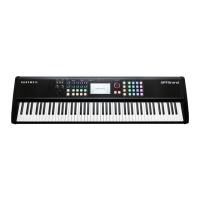38
Chapter 5. FX Editing
Chapter 5
Chapter 5. FX Editing
5-1 FX Bus
The effect bus (FX Bus) menu houses the parameter
controls for the four insert effect busses (FX A, FX B, FX C,
and FX D). Each effects bus is comprised of 5 sections;
Dynamics(Dyn), Parametric EQ (P.EQ), Modulation/Wah-
Wah (Mod/Wah), Delay/Tremolo (Dly/Trm), and Mix.
Adjust all parameter dials by touch, alpha wheel (once
selected), Increase+/Decrease- buttons, or tap the value
field to open a numeric keypad for more precise data entry.
5-1-1 Dyn (Dynamic)
The Dynamics section consists of three different
effects processes: Compression, Distortion, and Bit
Crusher.
5-1-1-2 Distortion
There are 6 distortion character types available: Over-
drive, Distortion, Fuzz, Fuzz2, Tube, and Asymmetrical.
With each type, you have fine-tune adjustments for
Input and Output Brightness, Drive and Output Level.
Input Brightness - A low pass filter allowing you to
color the signal feeding into the distortion circuit.
5-1-1-1 Compressor
The compressor circuit offers controls for Gain, Threshold, Ratio, Attack, and Release.
Gain - Amplifies the post-compression signal (aka make-up gain).
Threshold - Sets the level at which compression begins. Higher values lead to less compression whereas lower
values compress more of the signal.
Ratio - Determines how much gain reduction the compressor applies when the signal passes above the set thresh-
old level. Higher values equal more gain reduction.
Attack - Controls the time it takes for compression to begin once
the signal level surpasses the threshold. Lower values equal faster attack times (reducing attack transients) where
larger values equal slower attack times (allowing more of the attack transients to pass through).
Release - Controls how long it will take for the compression to relax once the signal has fallen below the threshold.

